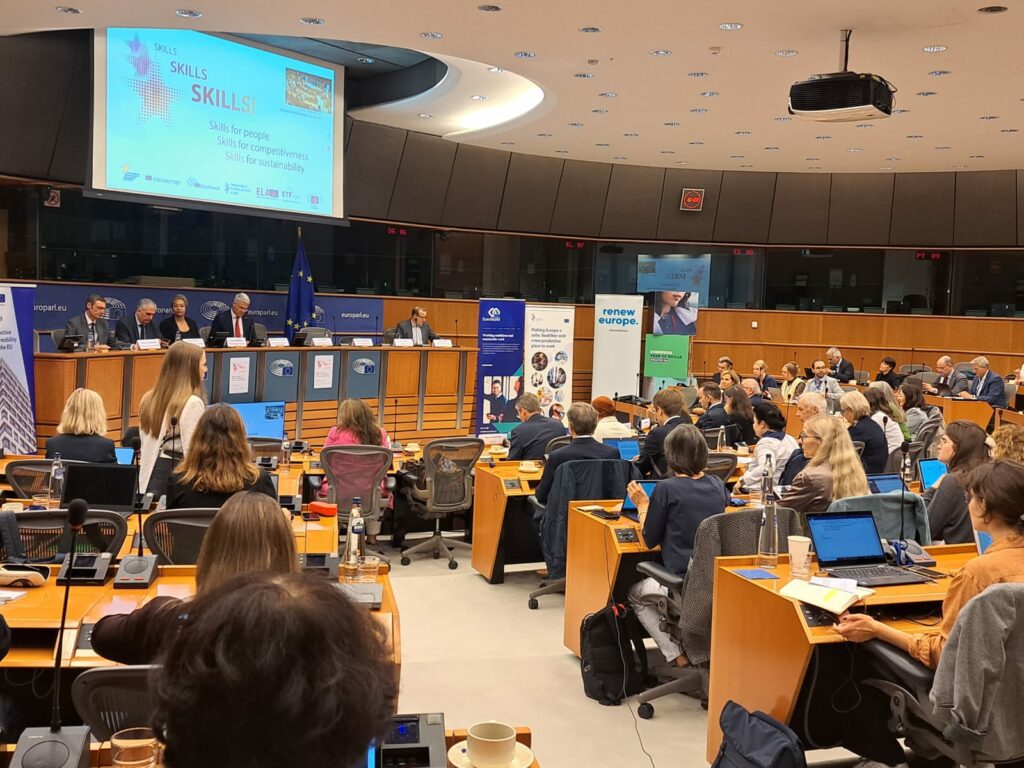Skills Skills Skills! Key Takeaways from the Flagship Conference
21/09/2023

To explore the role of skills in our future, the “Skills, skills, skills! Skills for people, skills for competitiveness, skills for sustainability” event brought together a diverse range of experts, policymakers, and professionals to the European Parliament. As an association of regional and local authorities for lifelong learning, EARLALL attended to gain a perspective on the EU situation with skills and to compare it with the experience of their regional members. The European Parliament Employment and Social Affairs (EMPL) Committee organised the event in cooperation with five EU agencies working in the field of employment, social affairs and inclusion and the European Commission.
The conference was opened by MEP Dragoș Pîslaru, Chair of the EMPL Committee in the European Parliament, who emphasized the need to redefine our approach to social investment, as investing in “ in skills needs to go hand in hand with the social investment in people”. Pîslaru stressed that sustainability is essential to drive skills development effectively. Joost Korte, Director-General of EMPL at the European Commission, then expanded on the theme of investment, emphasizing the need for a broader perspective. He discussed the transformative role of skills in boosting competitiveness, sustainability, and economic growth, especially during times of twin transitions.
The first round of expert talks from the directors of five key EU Agencies began with Cosmin Boiangiu, Executive Director of ELA (European Labour Authority), who addressed the issue of labour shortages in Europe. He stressed that labour shortages are indeed increasing and that simply matching existing jobs with people is insufficient. Boiangiu advocated for a shift towards matching people with the necessary skills, highlighting the importance of discovering and harnessing individual skills.
The floor was then taken by William Cockburn, Interim Executive Director of EU-OSHA (European Agency for Safety and Health at Work), who shed light on the significance of education and training in health and safety. He highlighted that workers need skills not only to perform their jobs safely but also to understand their rights in the workplace. Young workers and newcomers are particularly vulnerable, placing vocational education and training (VET) at the centre of these issues.
This was followed by Ivailo Kalfin, Executive Director of Eurofound, who explored factors beyond skill mismatches contributing to labour shortages. He pointed out that skills should be an integral part of an organization’s DNA, impacting competitiveness and well-being. Kalfin highlighted disparities in training levels among different groups, including women, people with disabilities, and temporary workers.
Next, Jürgen Siebel, Executive Director of Cedefop (European Centre for the Development of Vocational Training), discussed the evolving landscape of vocational education and training. He highlighted the importance of adapting to current megatrends and disruptions, such as COVID-19 and the energy crisis. Siebel emphasized the growing demand for higher-skilled jobs driven by initiatives like the European Green Deal.
Finally, Pilvi Torsti, Director of ETF (European Training Foundation), presented the EU’s global approach to skills and education, emphasizing factors like migration, mobility, and sustainability while considering third-country perspectives.
During the second expert discussion, Irene Mandl, Head of Unit at ELA, highlighted labour shortages in various sectors and regions, emphasizing the link between those regions which face higher labour gaps and having less-equipped educational infrastructures. EARLALL particularly welcomed these findings, as its regional members have long prioritised developing educational infrastructure in adult learning, VET, formal and informal learning with the view of the labour market in mind.
Ilias Livanos, an expert at Cedefop, stressed the importance of looking beyond numbers to consider the actual skills required in the workforce. Tina Weber, Research Manager at Eurofound, discussed the challenging working conditions in certain occupations, emphasizing the need for more support for care responsibilities and offering training during working hours.
The day’s discussions were then followed by a Q&A by MEP Sara Matthieu. She raised concerns about inclusivity and gender disparities in skills development. The session was then wrapped up by MEP Dragoș Pîslaru, who highlighted the expertise of the EU agencies as well as the need for cross-cutting actions relating to skills.
More information: https://www.etf.europa.eu/en/news-and-events/press/five-eu-agencies-spearhead-green-and-digital-skills-development-eu-and-beyond




